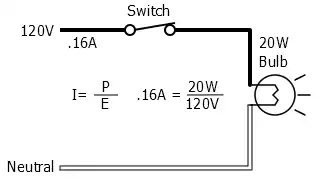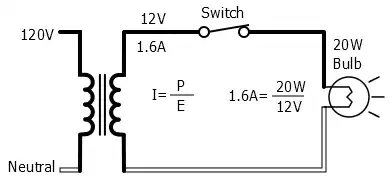



Low voltage is defined as 50 volts (V) or less. Common low voltages are 12V, 24V, and 48V. Low voltage is normally used for doorbells, garage door opener controls, heating and cooling thermostats, alarm system sensors and controls, outdoor ground lighting, household and automobile batteries.
Low voltage is supplied by batteries, or by a transformer that converts line voltage to a low voltage. Low voltage (when the source is operating properly) will not provide a shock from contact. However, a high current, low voltage short circuit (automobile battery) can cause an arc flash and possible burns.
Ohm’s Law and Low Voltage
Doorbells, garage door opener controls, heating and cooling thermostats, alarm system sensors and controls all use a very small amount of current. They are usually wired with telephone cable, which use very small wires. Low voltage lighting systems can carry a higher amount of current and will need larger diameter wires.
In the left diagram below, a 20 watt (W) bulb with a 120V source draws .16 amp.
In the right diagram below, a 20 W bulb with a 12V source draws 1.6 amps (10 times more current than a 120V source).
12 Volt 20 Watt Light Bulb Circuit
120 Volt 20 Watt Light Bulb Circuit
Calculate Low Voltage Cable Size and Transformer Wattage Rating
To calculate proper cable size and transformer wattage, add the wattage rating of all of the lights that will be connected together. For continuous load purposes, multiply the watts total by 125%.
Example: Lighting system uses six 12V, 20 W lights.
- Total Watts: 6 * 20 W = 120 W.
- Continuous load total watts: 120 W * 125% (1.25) = 150 W
- Convert watts to amps: 150 W / 12V = 12.5 A.
Minimum transformer watts = 150, minimum cable size = 14 AWG. It is recommended to use a higher transformer wattage and larger cable size to allow for adding more lights.
Low Voltage
Low Voltage Lighting Systems
Low voltage lighting systems usually use LED bulbs because they are energy efficient and draw a small amount of current. They can also use halogen bulbs, but draw more current than LED bulbs.
The best way to purchase multiple low voltage lights is by buying a kit. The kit includes the lights, cables, and transformer. A kit will match cable size and length and transformer output capacity for the wattage rating of all of the lights. If you purchase these items separately, or add lights to a kit, you will need to calculate cable size and transformer output capacity.
Low Voltage and Electrical Codes
Low voltage lighting cables usually allow for direct burial of the cable without conduit (direct burial should be listed on the packaging). About the only electrical code restriction for a low voltage system is that the transformer be connected to a GFCI protected outlet or circuit, when installed in locations that require GFCI protection .
|
Recommended Cable Size for Low Voltage Lighting
|
|
Amps
|
Wire Size (AWG)
|
|
7
|
18
|
|
10
|
16
|
|
15
|
14
|
|
20
|
12
|
|
25
|
10
|



Low Voltage Circuit Diagrams



